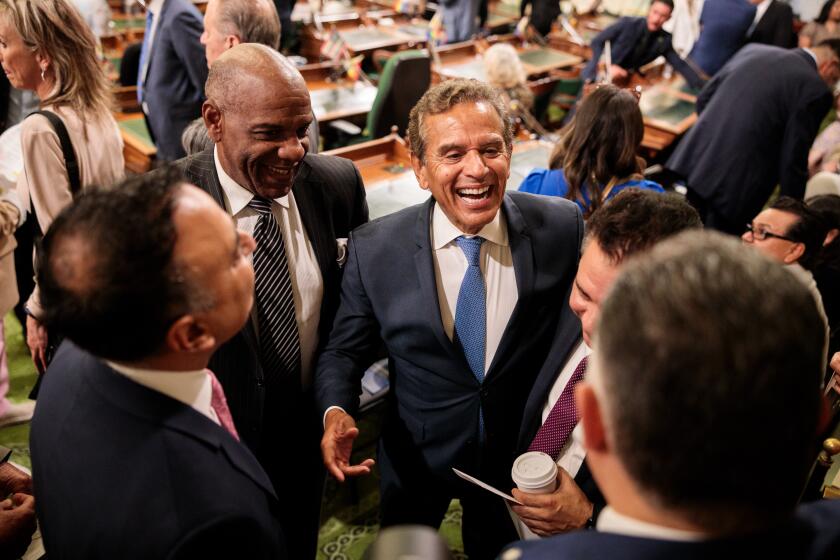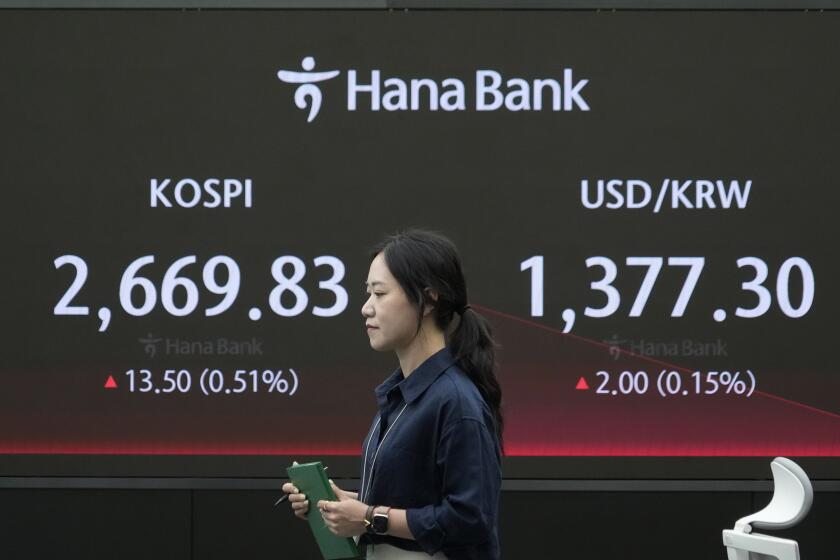Tax Reform Noise Begins to Pressure Muni Bond Yields
Federal tax reform may seem a long way off, but it’s apparently close enough to make some municipal bond investors start to sweat.
Yields on tax-exempt muni bonds have been rising for nearly two weeks, even though long-term U.S. Treasury bond yields have eased. Analysts say the sudden turnabout in the muni market, after a four-month-long slide in yields, is largely attributable to the fresh noise Congress is generating about tax reform.
Consider the “flat tax” idea, for example. Several proposals are floating around Capitol Hill to replace the current progressive income tax with a one-size-fits-all rate. If that rate were relatively low--such as the 17% touted by House Majority Leader Dick Armey (R-Tex.)--many people now in much higher tax brackets might be far less hungry for the tax-free interest of muni bonds.
The probable outcome: Muni yields would have to surge to compete with returns on other investments.
Likewise, replacing the income tax system with a consumption tax, the pet idea of House Ways and Means Committee Chairman Bill Archer (R-Tex.), would leave all income untaxed, whether from wages or investments. Without their current tax exemption, muni bonds would compete directly with corporate and Treasury bonds for investors’ attention. Presumably, muni yields would automatically have to rise above yields on Treasuries, in theory the safest securities .
*
Contemplating the possible unpleasantness of all this for the $1.2-trillion muni bond market, investors have pushed the tax-free yield on the Bond Buyer index of 40 long-term muni bonds to 6.36% today from a 1995 low of 6.22% on April 18, while the taxable yield on 30-year Treasury bonds has slipped from 7.39% to 7.31%.
Munis’ move so far isn’t gigantic, of course. But it does seem somewhat prophetic, given Archer’s speech to the Public Securities Assn.’s annual meeting last Saturday. He admitted that Republican tax proposals are creating “potentially the biggest enemy to tax-exempt bonds.”
Yet in the same speech, Archer conceded that there’s a lot of blacktop between here and major tax reform. He doesn’t see a House vote before 1997--which means it’s a tad early for muni bond investors to be jumping to any conclusions about the ultimate fate of their securities.
“We’ve been through this many times before,” sighs Susan Keenan, a muni bond fund manager at Alliance Funds in New York.
Threats to munis’ privileged tax status have surfaced periodically for decades. In 1986, a scare proposal out of Congress briefly sent long-term muni yields above Treasury yields. The idea died, and muni yields plunged back to their usual levels of between 60% and 90% of yields on same-term Treasuries, depending on supply and demand.
But with Republicans controlling Congress for the first time in 40 years, isn’t the possibility of genuine tax reform more real this time?
Maybe. There are so many cross-currents to tax reform, however, that it’s dangerous to just assume that what might become law would unquestionably be negative for muni bonds. For example, if Congress were to exempt all investments from taxes, it’s conceivable that the national savings rate could rise so dramatically that interest rates would be pushed sharply lower across the board.
The only thing investors probably can assume for now is that volatility in the muni bond market will increase as the tax debate din grows. And that may be uncomfortable for some muni owners, perhaps more so for those in bond mutual funds--with their daily price fluctuations so visible--than in individual bonds. “I suspect we’re going to see the market affected every time a new tax proposal comes out,” warns Cadmus Hicks, analyst at John Nuveen & Co. in Irvine.
Some pros say the only intelligent approach to munis in this environment is to buy when market yields are relatively high and avoid selling when they’re relatively low. Currently, average yields on highest-quality 30-year muni bonds are about 82% of 30-year Treasury bond yields. That’s up from 78.3% in mid-April, but down from a high of more than 86% earlier this year. In other words, these muni returns aren’t bad--but you may do better by waiting, or by shopping around for higher-yielding bonds of slightly lower quality.
Jim Lynch, of Lynch Municipal Bond Advisory in New York, suggests another course for high-tax-bracket investors: Buy only shorter-term munis (say, under five years) and stick with individual bonds that will pay off in full at maturity, not open-ended bond funds.
(BEGIN TEXT OF INFOBOX / INFOGRAPHIC)
Munis: How Attractive?
Tax-free municipal bond yields have risen over the past week, but compared to taxable Treasury bond yields, they are still below last year’s peaks. Muni yields as a percentage of Treasury yields over the past year:
5-year bonds
30-year bonds
Note: Measures top-rated muni bonds
Source: Municipal Market Data






